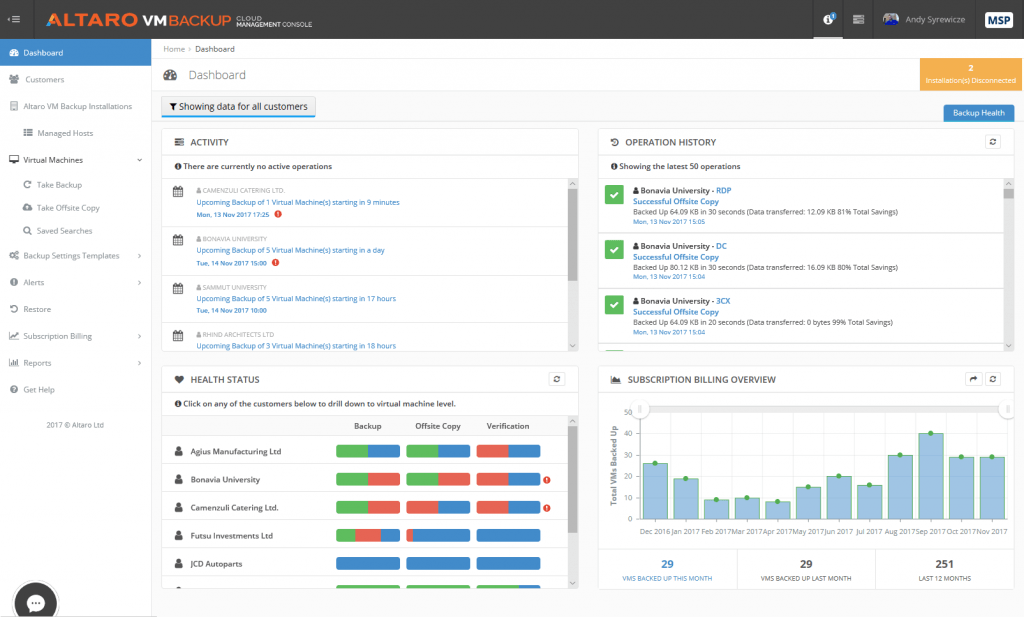Save to My DOJO
Many new and growing MSPs look at Backup-as-a-Service and see it as an easy cash cow. Your team installs some software, configures storage and backup jobs, and the cash rolls in, right?
Sadly, that’s not often the case. Very commonly, many MSPs find that providing BaaS services is more complex than they anticipated. Customer needs can quickly get murky due to various things: more engineering time is needed than you thought, backup jobs run inconsistently, and margins and profitability soon plummet.
Unfortunately, providing BaaS services is far from optional for MSPs. Many end customers expect backups to be taken care of as part of their service plan, and many won’t even look at an MSP that doesn’t offer BaaS anymore.
So, what are you to do? BaaS can be profitable and easy; you simply need to do things correctly from the start. Your starting point should be learning from experience and looking for common pitfalls that many organizations have encountered before you. What are those pitfalls, you ask? Let’s take a look, and while we’re at it, we’ll also discuss the key strategies for avoiding them.
Pitfall 1 – Lack of Standardization
If you think back to when service providers started, there weren’t many applications that made it easy to manage a solution across several disparate locations. This was especially true for the BaaS model.
Many of the early MSPs would just support whatever their customer had when they onboarded someone; ultimately, this practice created a problem of scale. After a year of new onboardings, you would find yourself managing ten different backup applications and storing backups in several different locations. Ultimately, it would take an entire team of engineers to manage the mess. The solution here, and the number one thing that I find that many new MSPs getting into BaaS don’t do, is setting standards.
Many owners will look at that and say it’s obvious, but many will stop at selecting a single backup application to go with and stop there. There are far more standards for BaaS than just picking the application you’re going to use, and those standards stretch across engineering, sales, and management boundaries. Standards you should have set when your BaaS practice goes live include:
- 1 or 2 defined backup solutions
- SLAs should be set for RTOs and RTOS
- SLAs should be set for each individual recovery type
- Defined terms such as what a customer “site” means or a “protected workload”
- Operational backup and restore best practices for staff
- Backup hardware and expected operational performance
- Monitoring and reporting methods and procedures
- Billing costs and methods
These are the basic minimum standards you should have in place, and going through the exercise of defining these will likely spurn some additional standards as well. Whatever standards you define will help shape your BaaS practice and help it run more smoothly and predictably.
Pitfall 2 – No Single Pane of Glass
Providing predictable and profitable BaaS services requires the utmost attention to efficiency. The less time you spend managing the backups, the more time your technical talent will have for other billable work.
With that in mind, you will want to ensure your BaaS service is equipped with a backup solution with MSPs in mind. Many backup vendors in the industry today don’t have a solution for easily managing multiple physical locations from one central console. While you don’t have to pick Altaro (though we’d certainly like it if you did!), Altaro VM Backup is one of the few backup applications in the market today, with a single-pane-of-glass tool for managing backups across your entire customer base.
It also acts as a good example, in this case, of a solution for the pitfall we are talking about, as shown in the picture below.
Views like the one shown here allow you to see what is happening with your backup operations across the entire customer base. Additionally, it will allow you to start backup and recovery jobs and make configuration changes from this portal, making management super easy!
Whatever tool you choose to act as the core of your BaaS services, make sure it is capable of this single-pane-of-glass management; it will make your day easier and your BaaS practice ultimately more profitable.
Pitfall 3 – No Recovery Testing
Let’s face it: it’s easy to back up a workload, but recovery is where the important stuff happens. If your restore job fails you when you need it most, the backups you’ve been taking all along don’t matter.
I’ve seen firsthand during time spent with MSPs that there is no quicker way to lose a loyal customer than to have them experience a data loss event. Data equals intellectual property for your end customers, and for many of them, their intellectual property IS their business. Without it, they either can’t operate their business or, worse, have no business.
With that in mind, you need to ensure you’re providing regularly scheduled recovery tests for each customer. Some things to take into consideration below when planning this:
- Recovery testing should be done *at least* quarterly
- Recovery testing should include site recovery testing as well as individual workload recovery
- Recovery testing needs to be a well-documented procedure
- Recovery testing should have hard-scheduled dedicated resources to it (Yes. it’s that important)
- End-Customers should be given the results in report format every time a recovery test is run to allow them to see value in the services you’re providing
Keeping these items in mind when planning your recovery testing will help you provide quality backup services and the reassuring knowledge for you (and your customers) that you can recover their data in the event of a disaster.
Pitfall 4 – Not Charging Enough
This pitfall really applies to most things in business, but I find that many MSPs, seeing backup as something simple, don’t charge enough for their backup services.
If you’re undervaluing your backup services from the start, it will be difficult to justify improvements or adding resources after the fact without increasing pricing on your customers. BaaS demands the proper staffing and attention to ensure that it’s running as it should be, and attempting to live within poorly priced operations by light staffing will ultimately lead to customer data loss.
Start at a healthy price point, and think about having some addon pricing (but not too many) for extra services such as encryption and/or offsite backups. Additionally, make sure that you’re keeping track of the software/hidden costs associated with your backup services as well. Such as:
- Hardware Costs
- Power/Cooling for any self-hosted hardware
- Colo/Hosting fees if hosting hardware offsite
- Man hours
- SMA and maintenance costs
When you’re working on your initial pricing, be sure to take these costs into account. Remember, a house built on unsure footing isn’t likely to be standing for too long.
Pitfall 5 – Ignoring Customer Education and Communication
One final but critical aspect often overlooked by MSPs is the importance of customer education and communication. While it’s vital to have all the technical aspects of BaaS finely tuned, neglecting to inform and educate your customers about what they’re getting can lead to misunderstandings and undervaluation of your services.
Customers who don’t understand the processes, risks, and value of their backups may see BaaS as a non-essential add-on, making it harder for you to justify the cost or to explain the importance of upgrades and maintenance.
Therefore, you must ensure your BaaS offering includes regular, clear communication about what is being backed up, how often, and what the recovery process involves. Educate customers about the risks of data loss and the value of quick, reliable recovery. Make sure they understand the significance of their investment in your backup solutions and feel confident in the service they’re receiving.
This approach not only solidifies customer trust and satisfaction but also enhances the perceived value of your BaaS, potentially leading to better customer retention and easier conversations around pricing and service enhancements.
Wrap-Up
By avoiding some of these pitfalls early in the game you can make sure that your BaaS services will be running and performing as profitably as possible. Not only that, your customer will be getting the fine-tuned backup services they deserve, and you’ll be able to be the hero to them when the time comes.
How about you? Do you have any tips on pitfalls to avoid or lessons learned?
Thanks for reading!


Not a DOJO Member yet?
Join thousands of other IT pros and receive a weekly roundup email with the latest content & updates!









